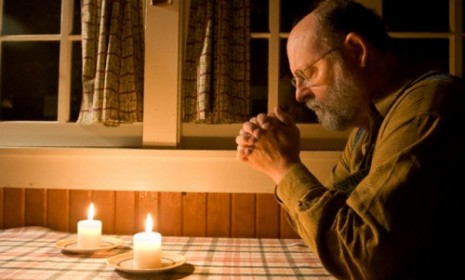National Day of Prayer: 'Unconstitutional'?
A federal judges says National Day of Prayer violates the separation of church and state

The National Day of Prayer has been held on the first Thursday in May for 59 years—but this may be the last year. U.S. District Judge Barabara Crabb last month ruled in favor of a Wisconsin atheist group, saying the day, though approved by Congress, violates the First Amendment. "The government may not use its authority to try to influence an individual's decision whether and when to pray," wrote Crabb. National Prayer Day Task Force leader Shirley Dobson condemned the decision as "an attack upon our religious freedoms." The Obama administration plans to challenge the judgment, postponing any changes to the holiday's status until all appeals are exhausted. Should the ruling be overturned? (Watch a Fox discussion about doing away with the National Day of Prayer.)
Face it, atheists—America is a religious nation: Despite what the atheists want you to believe, says Rev. Bill Schuler in Fox News, there's a "difference between freedom from religion and freedom of religion." Our Founding Fathers never intended "to create a nation where the recognition of God was absent from the public arena." And neither did "the framers of our Constitution, signers of the Declaration of Independence," and a long list of U.S. presidents, all of whom made religion a public matter.
"The role of faith in American life is in jeopardy"
The Week
Escape your echo chamber. Get the facts behind the news, plus analysis from multiple perspectives.

Sign up for The Week's Free Newsletters
From our morning news briefing to a weekly Good News Newsletter, get the best of The Week delivered directly to your inbox.
From our morning news briefing to a weekly Good News Newsletter, get the best of The Week delivered directly to your inbox.
The majority has no business telling people to pray: Yes, our government and our religion often mix, says the Oshkosh, Wis., Northwestern in an editorial. That, however, "ignores Crabb's point—that a National Day of Prayer, regardless of whether it reflects the beliefs of the majority, creates 'in' groups and 'out' groups." Because of this, "Congress ought to steer clear of all matters relating to religion," which means no National Day of Prayer.
"Ruling validates why government and religion don't mix"
Go ahead and pray —or don't: Whether you're for it or against it, says Wendy Kaminer in The Atlantic, the existence of the National Day of Prayer has little "practical effect on the exercise of anyone's liberty." That said, supporters should appreciate Americans' "right to be free of official orthodoxies." And "secularists" need to remember that "we don't have a constitutional right not to be irritated" by the religiosity of others.
A free daily email with the biggest news stories of the day – and the best features from TheWeek.com
-
 5 chilling cartoons about increasing ICE aggression
5 chilling cartoons about increasing ICE aggressionCartoons Artists take on respect for the law, the Fourth Amendment, and more
-
 Political cartoons for January 24
Political cartoons for January 24Cartoons Saturday's political cartoons include 3D chess, political distractions, and more
-
 Ryanair/SpaceX: could Musk really buy the airline?
Ryanair/SpaceX: could Musk really buy the airline?Talking Point Irish budget carrier has become embroiled in unlikely feud with the world’s wealthiest man